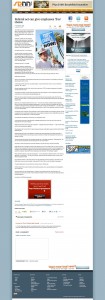This story was reported for San Diego News Network on April 21, 2009.

John Shaff once worked as a loss prevention officer at Nordstrom Rack in Woodland Hills, Calif. But after “Black Friday” of 2007, his days as a department store employee were numbered.
Shaff said it started when his managers brought out an abundance of merchandise to supplement the biggest shopping day of the year. When they stocked the merchandise in front of the emergency doors, Shaff protested and felt compelled to threaten to call the fire department.
It all tanked from there – so he claimed.
He said that after he pushed to have the racks removed from the emergency doors, his managers began to single him out and treat him poorly. Because of the alleged poor treatment, Shaff said he decided to form a union. His attempt failed.
Nordstrom fired him in June 2008.
Meanwhile, Nordstrom representative Brooke White said the managers cleared the safety violation promptly and that they are far from advocating against any union representation. She also said that Shaff was fired before his attempt to unionize and that the store had a union election that got voted down 50-20.
Shaff believes otherwise.
Since the re-introduction of the Employee Free Choice Act last month, Americans on both sides of the issue are advocating their points of view.
“If the Employee Free Choice Act was passed already, I would have been able to have a union at Nordstrom,” Shaff said. “But, I wasn’t.”
Although employees are able to form unions under current laws, if EFCA is enacted, employees will be able to unionize easier and quicker.
“Employees could easily unionize without any pressure from their employers,” Service Employees International Union director of communications Melinda Battenberg said.
EFCA had previously been introduced to the House and Senate and has also gained support from then-Sen. Obama. If the act is passed, it would essentially amend the current laws governed by the National Labor Relations Board (NLRB).
Right now, if an employee chooses to form a union — he or she must first start a petition asking employees in favor of unionizing to sign cards requesting representation. If more than 30 percent of employees sign the cards, an election is then held. However, employers are given the right to refuse union representation — as a whole. EFCA would force the NLRB to bring forth a bargaining representative on behalf of the employees, making the formation of a union a little bit easier.
Furthermore, EFCA would allow union employees to request a federal mediator for the bargaining process, provide a supplement for any employees that have proven to be wrongfully terminated and have a $20,000 penalty for any employers who have been proven to violate the legislation.
The proponents and opponents of EFCA aren’t too surprising for many.
Unions across the country are advocating for its passage stating that the current laws don’t fully protect the employees from anti-union-employers.
Battenberg said EFCA would simply allow employees — especially lower-paid employees — to gain a better salary, which is why corporations are against it.
“Big employers don’t want the EFCA to pass because employees will get higher wages and better health benefits,” Battenberg said.
Battenberg said that under current legislation, employers often hassle employees if they begin petitioning for unions. She added that some may even go as far as to terminate or threaten their employees if they continue to attempt to unionize.
“We want to take away some of the intimidation that goes on in these larger corporations,” Battenberg said. “We want to make the process faster and free employees from their discriminators.”
She spoke of various employees who have been offended in the past and many have been terminated.
Shaff said that kind of intimidation is exactly what happened to him, and he refuses to let it go, even a year later. Shaff, who has advocated with United Food and Commercial Workers, said he doesn’t want what happened to him to happen to other Nordstrom employees. He also said during his petitioning for a union, Blake Nordstrom, the head of the company, visited Shaff’s store to speak about the company’s “Fair Workplace” program.
White said that Nordstrom actually has 35 employees — some in alterations in Seattle and others in the receiving department in the Midwest — who are union members. White also said that Nordstrom would not thwart union efforts as proposed by Shaff.
But Christopher Hoffman, a San Diego attorney who has represented numerous employers, said stories such as Shaff’s aren’t uncommon and vice versa. He also said EFCA had “little to do with the welfare of employees.”
“It’s good marketing but it has very little to do with free choice,” Hoffman said.
Hoffman added EFCA would eliminate the secret balloting process, thus, causing employees to feel obligated to vote a certain way.
As the Act stands now, Sen. Barbara Boxer is in support of the proposal while Sen. Diane Feinstein is not. According to a report by the Center on Policy Initiatives, Feinstein is one of nine votes that are needed to pass the proposed legislation.
Hoa Quach is the political editor for the San Diego News Network.
